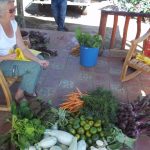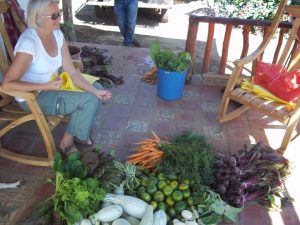
“My job is not a job, it’s just an ongoing series of interesting things to do.” Paulette Goudge, director of the Mariposa Spanish School and Eco-hotel in San Juan de la Concepcion, Nicaragua, discussed the trials and benefits of running an eco-tourism business.

The Mariposa organic farm produces 3/4 of every guest’s meal. The buildings have 9 solar panels that produce most of their energy. The showers are heated through solar thermal energy. There is no washing machine; instead, Paulette pays local women to do the washing by hand: “They will all tell you we’d rather do the washing by hand and have more of us employed.” At the moment, the hotel and study center employ 65 locals. Goudge works to evolve projects that respond to locally voiced needs – responding to nutrition, gardening recreation, animal, and day care needs. “I hardly ever initiate a project,” said Goudge.
Goudge advised all travelers to ask three questions of any purported ecotourism business:
- Do you pay your employees minimum wage?
- Where does your water come from?
- Where does your profit go?
The Mariposa puts money directly into the local economy through providing fair wages to its employees and buying materials from locals. But Goudge cautioned, “there’s a downside to that. Walmart is about to move in because there is disposable income. That is almost totally our fault.”
“If any ecotourist business tries to tell you it’s perfect, you know there’s something wrong,” said Goudge. She admitted to having horrible relations with her neighbor because she is constantly reporting him to the police for cutting down trees illegally.
Goudge spoke of the people, animals, and projects at the Mariposa with affection and nostalgia. Her love for this place was palpable. She couldn’t wait to return.
Written by Claire Lafave ’12, CES Research Assistant